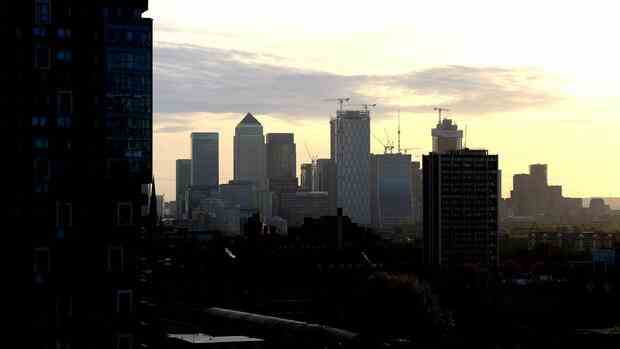In the three-month period from August to October, economic output fell by 0.3 percent, as the national statistics office ONS announced on Monday.
(Photo: Bloomberg)
Berlin,London The British economy, battered by high inflation and the energy crisis, is shrinking at its fastest rate since the corona restrictions in early 2022. In the three-month period from August to October, economic output fell by 0.3 percent, as the national statistics office ONS announced on Monday.
In October, however, there was an increase in gross domestic product (GDP) of 0.5 percent, after a minus of 0.6 percent in the previous month. In September, there was a day off due to Queen Elizabeth’s state funeral, which had a negative impact on economic output.
With the increase in GDP in October, the British economy is now 0.4 percent above the level before the corona crisis, according to the ONS. But Treasury Secretary Jeremy Hunt spoke of a tough road ahead of Britain with a view to the economic outlook.
Like the rest of Europe, the country is not immune to the aftershocks of the corona crisis, the consequences of the Ukraine war and the high gas prices on the world market. The Bank of England (BoE), poised for its ninth straight rate hike, expects a long recession.
Top jobs of the day
Find the best jobs now and
be notified by email.
DWS economist Katrin Löhken points out that falling real incomes with an inflation rate of 11.1 percent are depressing domestic demand: “And previous interest rate hikes are eating away at the economy.” This makes it difficult for the central bank to make decisions about the level of the next rate hike on Thursday .
The currency guardians are determined in principle to fight inflation. But opinions differed as to how much tightening would be needed. Some central bankers feared that too many or too large rate hikes could unnecessarily deepen the recession. “Ultimately, a vote to raise the key interest rate by 50 basis points seems plausible, which would increase the key interest rate to 3.50 percent,” says the DWS economist.
British industry suffered from rising commodity prices and borrowing costs, as well as falling consumer demand. The latest official data showed that production in September was 5.8 percent lower than a year earlier. The sector is also pessimistic about the future. Production will shrink by 3.2 percent in 2023, after a drop of 4.4 percent in the current year, forecasts the Make UK association.
More: London plans “liberation strike” from old EU rules for banks and insurance companies
